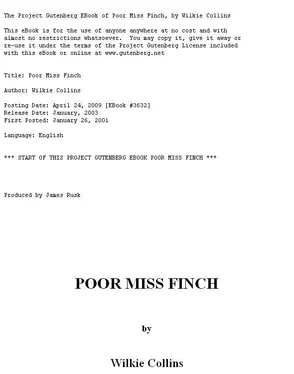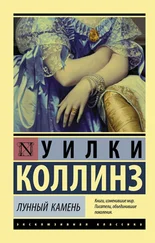Уилки Коллинз - Poor Miss Finch
Здесь есть возможность читать онлайн «Уилки Коллинз - Poor Miss Finch» весь текст электронной книги совершенно бесплатно (целиком полную версию без сокращений). В некоторых случаях можно слушать аудио, скачать через торрент в формате fb2 и присутствует краткое содержание. Год выпуска: 2002, Жанр: Классическая проза, на английском языке. Описание произведения, (предисловие) а так же отзывы посетителей доступны на портале библиотеки ЛибКат.
- Название:Poor Miss Finch
- Автор:
- Жанр:
- Год:2002
- ISBN:нет данных
- Рейтинг книги:3 / 5. Голосов: 1
-
Избранное:Добавить в избранное
- Отзывы:
-
Ваша оценка:
- 60
- 1
- 2
- 3
- 4
- 5
Poor Miss Finch: краткое содержание, описание и аннотация
Предлагаем к чтению аннотацию, описание, краткое содержание или предисловие (зависит от того, что написал сам автор книги «Poor Miss Finch»). Если вы не нашли необходимую информацию о книге — напишите в комментариях, мы постараемся отыскать её.
Poor Miss Finch — читать онлайн бесплатно полную книгу (весь текст) целиком
Ниже представлен текст книги, разбитый по страницам. Система сохранения места последней прочитанной страницы, позволяет с удобством читать онлайн бесплатно книгу «Poor Miss Finch», без необходимости каждый раз заново искать на чём Вы остановились. Поставьте закладку, и сможете в любой момент перейти на страницу, на которой закончили чтение.
Интервал:
Закладка:
Having reported how the rector spoke, in the presence of the disaster which had fallen on the family, I have only to complete the picture by stating next what he did. He borrowed two hundred pounds of Oscar; and left off commanding red herrings in the day and disturbing Mrs. Finch at night, immediately afterwards.
The dull autumn days ended, and the long nights of winter began.
No change for the better appeared in our prospects. The doctors did their best for Oscar—without avail. The horrible fits came back, again and again. Day after day, our dull lives went monotonously on. I almost began now to believe, with Lucilla, that a crisis of some sort must be at hand. "This cannot last," I used to say to myself—generally when I was very hungry. "Something will happen before the year comes to an end."
The month of December began; and something happened at last. The family troubles at the rectory were matched by family troubles of my own. A letter arrived for me from one of my younger sisters at Paris. It contained alarming news of a person very dear to me—already mentioned in the first of these pages as my good Papa.
Was the venerable author of my being dangerously ill of a mortal disease? Alas! he was not exactly that—but the next worst thing to it. He was dangerously in love with a disreputable young woman. At what age? At the age of seventy-five! What can we say of my surviving parent? We can only say, This is a vigorous nature; Papa has an evergreen heart.
I am grieved to trouble you with my family concerns. But they mix themselves up intimately, as you will see in due time, with the concerns of Oscar and Lucilla. It is my unhappy destiny that I cannot possibly take you through the present narrative, without sooner or later disclosing the one weakness (amiable weakness) of the gayest and brightest and best-preserved man of his time.
Ah, I am now treading on egg-shells, I know! The English specter called Propriety springs up rampant on my writing-table, and whispers furiously in my ear, "Madame Pratolungo, raise a blush on the cheek of Innocence, and it is all over from that moment with you and your story." Oh, inflammable Cheek of Innocence, be good-natured for once, and I will rack my brains to try if I can put it to you without offense! May I picture good Papa as an elder in the Temple of Venus, burning incense inexhaustibly on the altar of love? No: Temple of Venus is Pagan; altar of love is not proper—take them out. Let me only say of my evergreen parent that his life from youth to age had been one unintermitting recognition of the charms of the sex, and that my sisters and I (being of the sex) could not find it in our hearts to abandon him on that account. So handsome, so affectionate, so sweet-tempered; with only one fault—and that a compliment to the women, who naturally adored him in return! We accepted our destiny. For years past (since the death of Mamma), we accustomed ourselves to live in perpetual dread of his marrying some one of the hundreds of unscrupulous hussies who took possession of him: and, worse if possible than that, of his fighting duels about them with men young enough to be his grandsons. Papa was so susceptible! Papa was so brave! Over and over again, I had been summoned to interfere, as the daughter who had the strongest influence over him. I had succeeded in effecting his rescue, now by one means, and now by another; ending always, however, in the same sad way, by the sacrifice of money for damages—on which damages, when the woman is shameless enough to claim them, my verdict is, "Serve her right!"
On the present occasion, it was the old story over again. My sisters had done their best to stop it, and had failed. I had no choice but to appear on the scene—to begin, perhaps, by boxing her ears: to end, certainly, by filling her pockets.
My absence at this time was something more than an annoyance—it was a downright grief to my blind Lucilla. On the morning of my departure, she clung to me as if she was determined not to let me go.
"What shall I do without you?" she said. "It is hard, in these dreary days, to lose the comfort of hearing your voice. I shall feel all my security gone, when I feel you no longer near me. How many days shall you be away?"
"A day to get to Paris," I answered; "and a day to get back—two. Five days (if I can do it in the time) to thunder-strike the hussy, and to rescue Papa—seven. Let us say, if possible, a week."
"You must be back, no matter what happen, before the new year."
"Why?"
"I have my yearly visit to pay to my aunt. It has been twice put off. I must absolutely go to London on the last day of the old year, and stay there my allotted three months in Miss Batchford's house. I had hoped to be Oscar's wife before the time came round again——" she waited a moment to steady her voice. "That is all over now. We must be parted. If I can't leave you here to console him and to take care of him, come what may of it—I shall stay at Dimchurch."
Her staying at Dimchurch, while she was still unmarried, meant (under the terms of her uncle's will) sacrificing her fortune. If Reverend Finch had heard her, he would not even have been able to say "Inscrutable Providence"—he would have lost his senses on the spot.
"Don't be afraid," I said; "I shall be back, Lucilla, before you go. Besides, Oscar may get better. He may be able to follow you to London, and visit you at your aunt's."
She shook her head, with such a sad, sad doubt of it, that the tears came into my eyes. I gave her a last kiss—and hurried away.
My route was to Newhaven, and then across the Channel to Dieppe. I don't think I really knew how fond I had grown of Lucilla, until I lost sight of the rectory at the turn in the road to Brighton. My natural firmness deserted me; I felt torturing presentiments that some great misfortune would happen in my absence; I astonished myself—I, the widow of the Spartan Pratolungo!—by having a good cry, like any other woman.
Sooner or later, we susceptible people pay with the heartache for the privilege of loving. No matter: heartache or not, one must have something to love in this world as long as one lives in it. I have lived in it—never mind how many years—and I have got Lucilla. Before Lucilla I had the Doctor. Before the Doctor—ah, my friends, we won't look back beyond the Doctor!
CHAPTER THE NINETEENTH
Second Result of the Robbery
THE history of my proceedings in Paris can be dismissed in a very few words. It is only necessary to dwell in detail on one among the many particulars which connect themselves in my memory with the rescue of good Papa.
The affair, this time, assumed the gravest possible aspect. The venerable victim had gone the length of renewing his youth, in respect of his teeth, his hair, his complexion, and his figure (this last involving the purchase of a pair of stays). I declare I hardly knew him again, he was so outrageously and unnaturally young. The utmost stretch of my influence was exerted over him in vain. He embraced me with the most touching fervour; he expressed the noblest sentiments—but in the matter of his contemplated marriage, he was immovable. Life was only tolerable to him on one condition. The beloved object, or death—such was the programme of this volcanic old man.
To make the prospect more hopeless still, the beloved object proved, on this occasion, to be a bold enough woman to play her trump card at starting.
I give the jade her due. She assumed a perfectly unassailable attitude: we had her full permission to break off the match—if we could. "I refer you to your father. Pray understand that I don't wish to marry him, if his daughters object to it. He has only to say, 'Release me.' From that moment he is free." There was no contending against such a system of defence as this. We knew as well as she did that our fascinated parent would not say the word. Our one chance was to spend money in investigating the antecedent indiscretions of the lady's life, and to produce against her proof so indisputable that not even an old man's infatuation could say, This is a lie.
Читать дальшеИнтервал:
Закладка:
Похожие книги на «Poor Miss Finch»
Представляем Вашему вниманию похожие книги на «Poor Miss Finch» списком для выбора. Мы отобрали схожую по названию и смыслу литературу в надежде предоставить читателям больше вариантов отыскать новые, интересные, ещё непрочитанные произведения.
Обсуждение, отзывы о книге «Poor Miss Finch» и просто собственные мнения читателей. Оставьте ваши комментарии, напишите, что Вы думаете о произведении, его смысле или главных героях. Укажите что конкретно понравилось, а что нет, и почему Вы так считаете.






